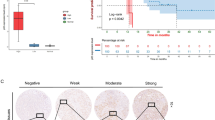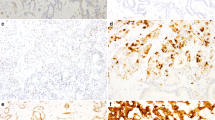Abstract
p53 plays a pivotal role in the prevention of human tumor formation. p73 and p63 are new members of the p53 tumor suppressor family, which are becoming increasingly recognized as important players in human tumorigenesis. However, the roles of these proteins are not well elucidated in extrahepatic bile duct (EBD) carcinoma. We examined expressions of the p63 and p73 genes and proteins in normal biliary epithelia, biliary dysplasias, and EBD carcinomas using immunohistochemistry and RT-PCR analysis. p63 and p73 proteins were overexpressed in 26.3 and 41.0% of EBD carcinomas, respectively. p63 protein expression was more frequent in tumors with vascular invasion (P = 0.002) and distal location (P = 0.04), while p73 expression was more common in cancers with deeper tumor invasion (P = 0.04). Patients with tumors co-expressing both p63 and p73 were found to have a significantly worse overall survival rate compared to those with either p63 or p73 expression (P < 0.05) as determined in univariate and multivariate analyses. Our results strongly imply that the p53 family members have different functions in EBD carcinomas. Our data also indicate that interactions between p63 and p73 play an important role in tumorigenesis of EBD carcinoma.



Similar content being viewed by others
References
Barbieri CE, Pietenpol JA (2006) p63 and epithelial biology. Exp Cell Res 312:695–706
Carriaga MT, Henson DE (1995) Liver, gallbladder, extrahepatic bile ducts, and pancreas. Cancer 75:171–190
Cho NH, Kim YB, Park TK, Kim GE, Park K, Song KJ (2003) P63 and EGFR as prognostic predictors in stage IIB radiation-treated cervical squamous cell carcinoma. Gynecol Oncol 91:346–353
Choi HR, Batsakis JG, Zhan F, Sturgis E, Luna MA, El-Naggar AK (2002) Differential expression of p53 gene family members p63 and p73 in head and neck squamous tumorigenesis. Hum Pathol 33:158–164
Della Torre G, Pasquini G, Pilotti S, Alasio L, Civelli E, Cozzi G, Milella M, Salvetti M, Pierotti MA, Severini A (2000) TP53 mutations and mdm2 protein overexpression in cholangiocarcinomas. Diagn Mol Pathol 9:41–46
Green FL, Page DL, Haller DG, Flemming ID, Morrow M, Fritz A (2002) AJCC cancer staging manual, 6th edn. Springer-Verlag, Berlin Heidelberg New York
Hibi K, Trink B, Patturajan M, Westra WH, Caballero OL, Hill DE, Ratovitski EA, Jen J, Sidransky D (2000) AIS is an oncogene amplified in squamous cell carcinoma. Proc Natl Acad Sci USA 97:5462–5467
Ichimiya S, Kojima T, Momota H, Kondo N, Ozaki T, Nakagawara A, Toribio ML, Imamura M, Sato N (2002) p73 is expressed in human thymic epithelial cells. J Histochem Cytochem 50:455–462
Jarnagin WR, Koea JB, Klimstra DS (2002) Cancers of the biliary tree: staging, technique, and pathology. In: Dally JM, Kelson DP, Levin B, Kern SE, Tepper JE (eds) Gastrointestinal oncology: Principles and practice. Lippincott Williams & Wilkins, Philadelphia, pp 615–643
Jonas S, Springmeier G, Tauber R, Wiedenmann B, Lobeck H, Gessner R., Kreft B, Kling N, Moelling K, Neuhaus P (1998) p53 mutagenesis in Klatskin tumors. Hum Pathol 29:955–960
Kaghad M, Bonnet H, Yang A, Creancier L, Biscan JC, Valent A, Minty A, Chalon P, Lelias JM, Dumont X et al. (1997) Monoallelically expressed gene related to p53 at 1p36, a region frequently deleted in neuroblastoma and other human cancers. Cell 90:809–819
Liu L, Cui X, Sakaguchi T, Sasaki M, Suda T, Hatakeyama K (2001) Expression of p73 in colorectal carcinoma: clinicopathological relevance. J Int Med Res 29:297–303
Lo Muzio L, Santarelli A, Caltabiano R, Rubini C, Pieramici T, Trevisiol L, Carinci F, Leonardi R, De Lillo A, Lanzafame S et al. (2005) p63 overexpression associates with poor prognosis in head and neck squamous cell carcinoma. Hum Pathol 36:187–194
Momoi H, Okabe H, Kamikawa T, Satoh S, Ikai I, Yamamoto M, Nakagawara A, Shimahara Y, Yamaoka Y, Fukumoto M (2001) Comprehensive allelotyping of human intrahepatic cholangiocarcinoma. Clin Cancer Res 7:2648–2655
Niyazi M, Ghazizadeh M, Konishi H, Kawanami O, Sugisaki Y, Araki T (2003) Expression of p73 and c-Abl proteins in human ovarian carcinomas. J Nippon Med Sch 70:234–242
Nomoto K, Tsuneyama K, Cheng C, Takahashi H, Hori R, Murai Y, Takano Y (2006) Intrahepatic cholangiocarcinoma arising in cirrhotic liver frequently expressed p63-positive basal/stem-cell phenotype. Pathol Res Pract 202:71–76
Rocco JW, Leong CO, Kuperwasser N, DeYoung MP, Ellisen LW (2006) p63 mediates survival in squamous cell carcinoma by suppression of p73-dependent apoptosis. Cancer Cell 9:45–56
Sun XF (2002) p73 overexpression is a prognostic factor in patients with colorectal adenocarcinoma. Clin Cancer Res 8:165–170
Suto T, Habano W, Sugai T, Uesugi N, Funato O, Kanno S, Saito K, Nakamura S (2000) Aberrations of the K-ras, p53, and APC genes in extrahepatic bile duct cancer. J Surg Oncol 73:158–163
Swierczynski SL, Maitra A, Abraham SC, Iacobuzio-Donahue CA, Ashfaq R, Cameron JL, Schulick RD, Yeo CJ, Rahman A, Hinkle DA et al. (2004) Analysis of novel tumor markers in pancreatic and biliary carcinomas using tissue microarrays. Hum Pathol 35:357–366
Tannapfel A, Engeland K, Weinans L, Katalinic A, Hauss J, Mossner J, Wittekind C (1999a) Expression of p73, a novel protein related to the p53 tumour suppressor p53, and apoptosis in cholangiocellular carcinoma of the liver. Br J Cancer 80:1069–1074
Tannapfel A, Wasner M, Krause K, Geissler F, Katalinic A, Hauss J, Mossner J, Engeland K, Wittekind C (1999b) Expression of p73 and its relation to histopathology and prognosis in hepatocellular carcinoma. J Natl Cancer Inst 91:1154–1158
Tomkova K, Belkhiri A, El-Rifai W, Zaika AI (2004) p73 isoforms can induce T-cell factor-dependent transcription in gastrointestinal cells. Cancer Res 64:6390–6393
Vogelstein B, Lane D, Levine AJ (2000) Surfing the p53 network. Nature 408:307–310
Yang A, Kaghad M, Wang Y, Gillett E, Fleming MD, Dotsch V, Andrews NC, Caput D, McKeon F (1998) p63, a p53 homolog at 3q27–29, encodes multiple products with transactivating, death-inducing, and dominant-negative activities. Mol Cell 2:305–316
Yang B, House MG, Guo M, Herman JG, Clark DP (2005) Promoter methylation profiles of tumor suppressor genes in intrahepatic and extrahepatic cholangiocarcinoma. Mod Pathol 18:412–420
Zaika AI, El-Rifai W (2006) The role of p53 protein family in gastrointestinal malignancies. Cell Death Differ 13:935–940
Zaika AI, Slade N, Erster SH, Sansome C, Joseph TW, Pearl M, Chalas E, Moll UM (2002) DeltaNp73, a dominant-negative inhibitor of wild-type p53 and TAp73, is up-regulated in human tumors. J Exp Med 196:765–780
Acknowledgments
We thank Dr. El-Rifai for his assistance. Grant support: This work was supported by the National Cancer Institute; grant NIH CA-108956.
Author information
Authors and Affiliations
Corresponding author
Rights and permissions
About this article
Cite this article
Hong, SM., Cho, H., Moskaluk, C.A. et al. p63 and p73 expression in extrahepatic bile duct carcinoma and their clinical significance. J Mol Hist 38, 167–175 (2007). https://doi.org/10.1007/s10735-007-9084-7
Received:
Accepted:
Published:
Issue Date:
DOI: https://doi.org/10.1007/s10735-007-9084-7




